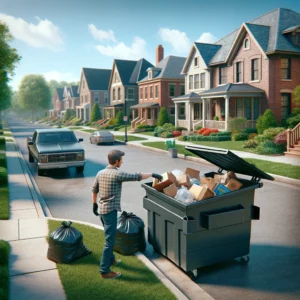Renting a dumpster for residential use, whether for a home renovation, clean-out, or a landscaping project, can quickly become an expensive endeavor. However, with a bit of planning and knowledge, you can significantly cut costs without compromising on your needs. Here are three crucial tips to help you save money when renting a residential dumpster.
1. Choose the Right Size

One of the most common mistakes people make when renting a dumpster is choosing the wrong size. It’s essential to accurately estimate the amount of waste you will generate to select the appropriately sized dumpster.
- Smaller Dumpsters: If you’re undertaking a small project, such as a bathroom renovation or clearing out a garage, a 15-yard dumpster might be sufficient. These are less expensive and can fit comfortably in most driveways.
- Larger Dumpsters: For larger projects like major home renovations or extensive yard work, you might need a 30-yard dumpster. Although bigger dumpsters have a higher initial rental cost, they are more economical than renting multiple smaller dumpsters.
Tip: Feel free to discuss your project in detail with the dumpster rental company. They can provide guidance based on their experience with similar projects, ensuring you get the best size for your needs without overspending.
2. Streamline Your Rental Time
Dumpster rentals are quoted on the duration of the rental, so it’s crucial to manage your rental period wisely.
- Plan Ahead: Before the dumpster arrives, make sure you are ready to start your project. Preparing your waste materials in advance can minimize the rental period needed.
- Speed Up Disposal: Try to complete your waste disposal more quickly by organizing waste removal among your team or family members, ensuring you’re not paying for extra days that you don’t actually need.
3. Avoid Overloading
Dumpster rentals come with specific rules regarding what you can and cannot dispose of, and breaking these rules can result in hefty fines. And overloading your dumpster can also lead to additional fees.
- Monitor the Fill Level: Most dumpsters have a fill line, indicating the maximum level to which you can safely load the dumpster. Keeping the debris level below this line will help you avoid overage charges.
- Know the Restrictions: Common prohibited items include hazardous materials like chemicals, batteries, asbestos, and sometimes even things like mattresses and electronics. Make sure you understand the list of banned items and find alternative disposal methods for them.
Tip: Always ask for a list of prohibited items when you book your dumpster, and inquire about the cost penalties for overloading. Some companies will offer guidance on how to best fill your dumpster to avoid additional costs.
Renting a residential dumpster doesn’t have to break the bank. By choosing the right size, optimizing your rental period, and carefully following disposal guidelines, you can manage your waste efficiently while keeping costs down. Remember, clear communication with your rental company is key—they’re there to help you make the most of your rental experience.
Dumpster rental with Black Box Dumpster
If you are looking for dumpster rental in Southern Indiana or Louisville, Kentucky, check out our Residential Services Page for more info about ordering a dumpster from Black Box Dumpster Rental.



